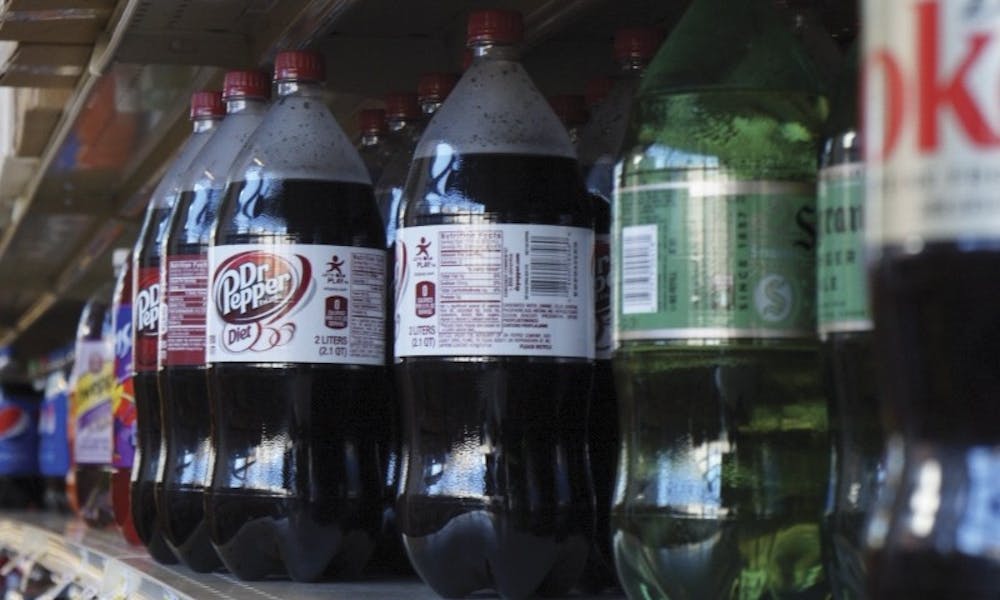Philadelphia’s new tax on sweetened beverages officially went into effect last Sunday, and the new 1.5-cent per ounce fee has already led local stores to raise their prices.
ShopRite Vice President Karen Meleta told Philly Mag that the chain has been forced to raise the price on over 3,000 items that fall under the purview of the new law. At the 40th and Walnut Street Fresh Grocer, a branch of ShopRite, this collective price raise is seen on the shopping tags of goods like Silk Almond Milk, Minute-Maid Lemonade, and Arizona Iced Tea; these now cost about 30, 45, and 50% more, respectively.
The tax will also affect University-contracted businesses such as Gourmet Grocer, Tortas Frontera and retailers in Houston Hall.
Director of Business Services and Hospitality Services Pam Lampitt explained that these businesses are permitted by the University to raise prices in response to “significant” increases in production costs. This new soda tax, which nearly doubles the price of a common sweetener, qualifies under these terms.
“Vendors who are purchasing [sweeteners] have their costs doubled immediately. And in retail settings, we allow our vendors to either not serve items, due to the costs, or incrementally increase the price of items they’re selling, to make up costs upon themselves,” Lampitt said. “So if you’re using your dining dollars, the cost of the soda will increase.”
For students on the University dining plan, Lampitt said that the tax will not affect the cost of meal plans or the selection of soda options available in Penn dining halls.
“Students on a dining plan with all-you-care to eat [meal swipes] will still be able to drink what they want, as much as they want, in Penn dining halls.” Lampitt said. “And meal plan prices will stay the same.”
How these price increases will impact the Penn community is unclear. According to Wharton professor Benjamin Lockwood, the tax will either incentivize a drop in sugared drink consumption, thus promoting a healthier lifestyle, or financially burden lower-income households.
“People at the bottom of the income distribution consume about twice as much as soda as the people at the top of the income distribution. So there’s a possibility that the soda tax could be very regressive,” Lockwood said. “But If people reduce their consumption a lot in response to the tax, then the people who are getting the largest health benefit are those who are consuming the most to begin with.”
However, in an interview with the Philadelphia Inquirer Wharton professor Robert Inman warned that if stores decide to pass on the cost of the tax by raising prices of staple items, then much of the law’s health benefit would disappear. Though this prediction is contradicted by stores such as ShopRite, which have explicitly labeled which goods the soda tax is affecting, Inman is waiting for more evidence.
“The fact of the matter is, businesses are going to spread the cost around among the least price-sensitive products - toilet paper, milk, a range of products,” Inman told the Inquirer. “They’ll still raise the price of soda, but it might not be penny for penny.”
College senior Wayne Schmitt worries what the tax will mean for lower-income students struggling with food insecurity. Last semester, Schmitt founded Free Food at Penn, an online Facebook group to promote the University’s less expensive and free food options.
“The tax itself isn’t bad on principle. It’s trying to promote healthier habits and important programs,” Schmitt said. “But I just need more evidence.”
However, Schmitt feels optimistic about the potential health benefits.
“If stores distribute the tax amongst other items that will be a very bad outcome ... especially for food insecure students and families,” Schmitt added. “But hopefully it’s going to push people to drinking more water and less soda, which is important for health.”









